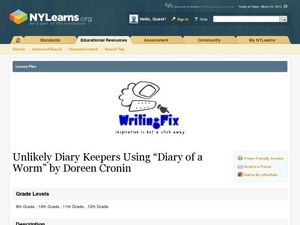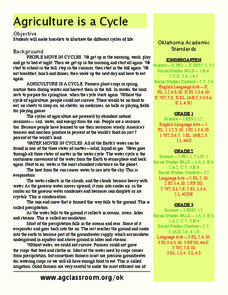Curated OER
Investigating an Enzyme-controlled Reaction: Catalase and Hydrogen Peroxide Concentration
Are you looking for a way to measure cellular respiration? Try it with pureed potatoes. With some standard high school science equipment, biologists can perform an investigation and collect data surrounding byproducts of respiration. You...
Curated OER
Neurons and the Nervous System
The highlight of this series is activitiy #4. Anatomy pupils examine slides of three unknown cells. With the function of the nervous system in mind, they consider the structure of each and try to guess which one is part of that system....
Curated OER
Animal Behavior
Can you train a worm? Biology buffs will have a blast trying! Using planaria or earthworms, they introduce a certain stimulus repeatedly until the desired response happens more quickly. They also explore the response of their own eyes to...
California Academy of Science
What Would Happen?
Nothing says classroom fun like an invertebrate and a magnifying glass! Snails, earthworms, and roly-poly bugs become the center of attention as pint-sized investigators hone their inquiry and observation skills. They are guided through...
University of Kentucky
The Great Spider Debate
Poor, misunderstood spiders! They are feared, disrespected, and detested by many people, yet they do so many positive things. A great addition to any insect unit, learn about some of the more common spiders, while hopefully dispelling...
Curated OER
Unlikely Diary keepers Using Diary of a Worm by Doreen Cronin
Put your class in the shoes of someone - or something - else with this lesson, which encourages writers to keep a diary from the perspective of a living creature or an abstraction. Use Doreen Cronin's Diary of a Worm and the Six Trait...
University of Minnesota
Sheep Brain Dissection
Bored with frog and earthworm dissections? Had your fill of fetal pigs? Anatomy young scholars will be intrigued by the sheep's brain, and you will be prepared with guiding questions, extension activities, and pictures as they dissect...
Curated OER
Mouse...Mouse...Snake!
Use this activity as an anticipatory set to warm up for a instructional activity on predator/prey relationships. Pupils will play a round of "Duck, Duck, Goose," substituting the ducks and geese for two animals that have a predator/prey...
Curated OER
The Human Impact on the Environment
Despite the typos and formatting issues, the Word document found here has some great potential. There are two questions that ask learners to put several events in a logical order; these could easily be made into a card sort activity....
Curated OER
Soil Scrolls
Third graders examine soil samples and explore the what happens in each layer of the subsoil. They work in cooperative groups to create a scroll that shows what takes place in each layer, and discuss why much of the activity is in the...
Curated OER
Brine Date
Have you been wondering what to do with that aquarium full of brine shrimp? This activity has teens sea monkeying around with measurement, observations, and hypothesizing about the mating behaviors of these little critters. If you do not...
Nuffield Foundation
Biodiversity in Your Backyard!
Take your enthusiastic ecologists outdoors to explore the biodiversity right in their own schoolyard! In preparing for this activity, it may be worthwhile to research websites with local flora to help in the plant identification portion.
Curated OER
Testing Leaves for Starch: the Technique
Like good scientists, kids often want to see first-hand why things are as they are; they can do just that in the starch-testing photosynthesis activity found here. Depending on the age of your pupils, you may wish to do the investigation...
Captain Planet Foundation
Shape Shifters in the Math Garden
Combines mathematical measurement with gardening skills. Third graders hunt for worms in the garden and try to find the longest one. They also measure and weigh vegetables that they harvest from the garden, measure rainfall amounts, and...
MOST
What Are Cells?
What's in a cell, anyway? Kids read informational text on what makes up both animal and plant cells, including a page of vocabulary terms they will need to be familiar with (cytoplasm, ribosomes, vacuoles, etc.). Full-color images make...
Curated OER
Who's in my soil!?!...and just what do they think they're doing there?
Middle schoolers discover organisms that inhabit the soil, the beneficial an detrimental roles these organisms play, and the interactions between the organisms and their environment and other organisms. Students participate in four...
Curated OER
Agriculture is a Cycle
Students explore cycles in nature. In this cross curriculum agriculture lesson, students define "cycle" and research weather and planting folklore. Students make a bracelet in which individual colored beads represent the many "cycles" of...
Curated OER
Watering Soil
In this watering soil worksheet, students complete a simple activity, following directions to use a watering can to sprinkle, pour slowly, then pour "faster" onto soil and write about what they notice. Teacher guide is on page 2.
Exploring Nature Educational Resources
Building A Classroom Food Web
From bears and owls to chipmunks and trees, all life depends on the sun for the energy to survive. Young biologists develop an understanding of this big idea as they arrange this series of plant and animal picture cards into food webs...
New South Wales Department of Education
Invertebrates
Of all invertebrates, insects by far are the most numerous. Scholars discuss invertebrates and then use a key to classify them. They see different examples and must describe features of each organism based upon the key.
Curated OER
Composting
In this recognizing items that can be composted learning exercise, students identify organic items that can be composted, write items that can be composted for each of the letters in the word compost, and make a list of vegetables and...
Curated OER
Science: Where the Worms Live
Students build mine-earthworm habitats to discover their niche in them. They make predictions about what the niche looks like in a week and draw a picture of it. Students notice the tunnels in the soil and how the sand and dirt are now...
Curated OER
More Bait for Your Buck!
Students determine where to buy the heaviest earthworms as they study invertebrates. They create a double bar graph of the results of the weight data.
Curated OER
Big Fat, Juicy Worms
Students collect and study information about worms. They discover how an earthworm helps process and loosen the soil. They write in their journals as well.

























